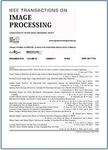版权所有:内蒙古大学图书馆 技术提供:维普资讯• 智图
内蒙古自治区呼和浩特市赛罕区大学西街235号 邮编: 010021

作者机构:Nanyang Technol Univ Sch Elect & Elect Engn Singapore 639798 Singapore Nokia Bell Labs Murray Hill NJ 07974 USA Univ Macau State Key Lab Internet Things Smart City Macau 999078 Peoples R China Univ Elect Sci & Technol China Sch Informat & Commun Engn Chengdu 611731 Peoples R China
出 版 物:《IEEE TRANSACTIONS ON IMAGE PROCESSING》 (IEEE Trans Image Process)
年 卷 期:2021年第30卷
页 面:5223-5238页
核心收录:
学科分类:0808[工学-电气工程] 08[工学] 0812[工学-计算机科学与技术(可授工学、理学学位)]
基 金:Ministry of Education, Republic of Singapore [RG137/20] National Natural Science Foundation of China [62020106011, U19A2052, 61971476] Macau Science and Technology Development Fund, Macau SAR [077/2018/A2, 0060/2019/A1]
主 题:Image restoration Image coding Dictionaries Adaptation models Minimization Image denoising Sparse matrices Group sparse coding low-rank regularized group sparse coding alternating minimization adaptive parameter adjustment image restoration
摘 要:Image nonlocal self-similarity (NSS) property has been widely exploited via various sparsity models such as joint sparsity (JS) and group sparse coding (GSC). However, the existing NSS-based sparsity models are either too restrictive, e.g., JS enforces the sparse codes to share the same support, or too general, e.g., GSC imposes only plain sparsity on the group coefficients, which limit their effectiveness for modeling real images. In this paper, we propose a novel NSS-based sparsity model, namely, low-rank regularized group sparse coding (LR-GSC), to bridge the gap between the popular GSC and JS. The proposed LR-GSC model simultaneously exploits the sparsity and low-rankness of the dictionary-domain coefficients for each group of similar patches. An alternating minimization with an adaptive adjusted parameter strategy is developed to solve the proposed optimization problem for different image restoration tasks, including image denoising, image deblocking, image inpainting, and image compressive sensing. Extensive experimental results demonstrate that the proposed LR-GSC algorithm outperforms many popular or state-of-the-art methods in terms of objective and perceptual metrics.